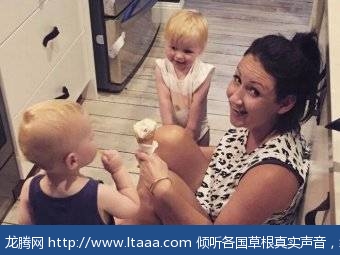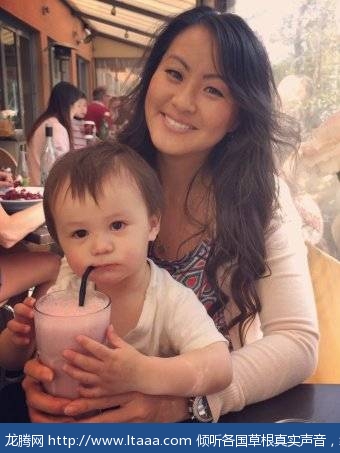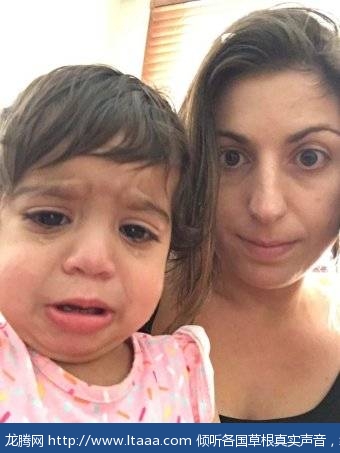产后抑郁、失禁和身材走样——初为人母未曾期待的痛苦 [美国媒体]
我31岁那年, 闺蜜圈子里到处都是新晋妈妈和孕妇。“你要抓紧啦”、“你将来的宝宝一定会很可爱”这些话总是不绝于耳。然而, 没有人抓住我的双肩告诫我说, 我会有大概百分之40的可能性经历大小便失禁,七分之一的可能性得产后抑郁;也没有人告诉我肚子上会长妊娠纹, 还会大把掉头发, 而社交媒体上的层出不穷的美好肉体会让这时的我会对自己多么失望。
Postnatal depression, incontinence, body image issues — the bombshells of motherhood
产后抑郁、大小便失禁和身材走样——初为人母未曾期待的痛苦
By Kellie Scott
——作者:凯莉斯科特
Updated 8 Mar 2017, 10:27pm Wed
2017年3月8日星期三晚上10点27分更新
At 31, new mums and pregnant women fill my inner circle, and phrases like "get cracking" and "you'd make cute babies" are often thrown around.
我31岁那年, 闺蜜圈子里到处都是新晋妈妈和孕妇。“你要抓紧啦”、“你将来的宝宝一定会很可爱”这些话总是不绝于耳。
No-one grabs me by both shoulders and says I have an almost 40 per cent chance of experiencing incontinence and a one in seven chance of postnatal depression.
然而, 没有人抓住我的双肩告诫我说, 我会有大概百分之40的可能性经历大小便失禁,七分之一的可能性得产后抑郁;
Or that my post-birth stretched stomach and thinning locks will constantly disappoint next to the unattainable images that flood social media.
也没有人告诉我肚子上会长妊娠纹, 还会大把掉头发, 而社交媒体上的层出不穷的美好肉体会让这时的我会对自己多么失望。
GPs would rather remind me "time is ticking" than flag the long list of side-effects, which also include haemorrhoids, birth defects and loss of career.
家庭医生会提醒我“生孩子的时间是有限的。”但是他们不会跟我讲生孩子也会有一长串的副作用, 包括痔疮、出生缺陷以及失业。
But they should. Because as several mums and experts shared with the ABC, talking about the difficulties of motherhood can help women not only survive one of life's most challenging feats, but make an informed decision about whether they want to do it at all.
但是他们应该告诉我的, 因为几位妈妈和专家同澳大利亚国家新闻网分享了他们的经历和观点, 认为提前告知女性产后会面临的困难不但会帮助她们安全度过人生中最困难的挑战, 而且会让她们拥有足够的知识来决定自己是否真的想要孩子。
'Hair loss was a total surprise'
“脱发问题完全在我意外”之外
Warrnambool mother of twins Jess Griffey said she was totally unprepared for how having kids would impact her self-confidence.
来自沃纳布奥的双胞胎母亲杰西格雷菲说她完全没有预料到生孩子会影响到她的自信心。
Photo: Jess Griffey says hair loss after birthing her twins has gotten her down sometimes. (Supplied: Jess Griffey)
照片:杰西格雷菲说在她诞下双胞胎之后出现了脱发的问题, 这让她有段时间心情非常糟糕。(图片由杰西格雷菲提供)
Three months after giving birth her hair began to fall out, a common condition following pregnancy called telogen effluvium (shedding of the hair).
产后三个月, 杰西开始出现脱发问题。 这是孕期结束后一个非常普遍的现象, 医学上称为产后休止期脱发。
"It was a total surprise. I didn't realise the extent of it until I saw a photo of myself at a wedding when they [my twins] were four months old. My hairline had receded a good 2 centimetres … I looked hideous," she said.
"The worst part though is when the hair started to grow back, now I have short hair combined with really long hair."
“我完全没预料到会出现这种问题。 之前没有注意到这个问题有多严重,直到后来有一次看到孩子四个月时我参加的一个婚礼的照片。 照片上我的发际线提高了两厘米多......看上去丑死了,”她说:“但那还不是最糟糕的时候。 最遭的是后来脱掉的头发又长出来了, 结果一部分头发非常长, 一部分非常短。”
Ms Griffey said the look was hard to disguise, but not from a lack of trying.
格雷菲太太说那种丑样子很难掩盖, 但她不是没有想过办法,也不是没有尝试过。
"I tried to hide my mullet with a clip-in fringe and I ended up looking like a Lego man," she laughs.
她笑着说:“我试着用带夹子的流苏把鲻鱼头(90年代流行的前短、侧短、后长的发型)盖住, 但这让我看起来就像是乐高玩具人。”
"It does get me down sometimes but I make an effort of telling everyone, even strangers, that I did not intentionally cut a mullet haircut, like they actually care."
“这让我消沉了一段时间。 但是我努力跟所有人, 包括陌生人去解释, 我不是故意剪了这么个发型—— 好像会有人真的在意一样。 ”
An obsession with poop has also been an eye-opener for Ms Griffey.
孩子对粪便的狂热也让格雷菲太太大开眼界。
"Nobody warned me that there was an age bracket in the human race that enjoyed eating their own faeces. Nobody warned me that no matter how hard I try my house will always look messy and dirty.
"But I wouldn't change a thing."
“没有人告诉我人类会在某一个时间段喜欢吃自己的粪便。 没有人警告过我说不管怎么尽力打扫, 家里总会又脏又乱。 但我完全改变不了什么。”
When the baby blues is something more
当产后抑郁不止是心情抑郁时
At her lowest point, Amanda Palm checked herself into the mental health unit of her local hospital because she was at risk of harming herself.
阿曼达朴在产后抑郁最痛苦的时候,害怕自己会自残, 于是在当地医院办了手续把自己送进了精神科病房。
Photo:Amanda Palm experienced depression throughout and after her pregnancy. (Supplied: Amanda Palm)
图片:阿曼达朴在孕期和产后都经历过抑郁症(图片由阿曼达朴提供)。
The Sydney mum of one had been experiencing perinatal depression — which occurs both during and after pregnancy.
"I'd come from a strong career in marketing, I was a really social person, and I thought this was the end of my life," Ms Palm said.
这位来自悉尼的母亲经历了孕产期抑郁症——这种病在孕期和产后都会发生。朴太太说:“我曾经在市场营销方面的事业做得非常好, 而且那时很善于交际。 当被抑郁症折磨时,我觉得快活不下去了。”
Beyondblue statistics show one in 10 women will experience depression during pregnancy, and one in seven the year following the birth of their baby.
澳大利亚非盈利性心理治疗机构“超越抑郁”(Beyongblue)对数据做了分析, 发现十分之一的妇女会经历孕期抑郁, 七分之一的妇女会在经历产后抑郁。
In fact, women are more likely to experience a mental health condition around the time of having a baby than at any other stage of their life.
事实上, 女性在生育期间比人生其他的任何阶段都更容易出现心理问题。
Ms Palm said refusing to be ashamed of her depression has been well received by others.
"Mums really appreciate the honesty and how candid I am in the way I explain my experience," she said.
朴太太说现在其他人都非常认同她不再为抑郁症感到羞耻所做出的进步。她说:“妈妈们都很感激我能够诚实、坦率地讨论自己的经历。”
Despite the hardships she has faced, Ms Palm is in a place she can be off medication and try for another baby.
尽管朴太太有过非常痛苦的产后抑郁症, 现在的她不但不需要接受药物治疗, 而且在努力拼二胎。
"You can't explain to people without children what it's like, it's just in your heart," she said.
"Having a child makes you feel so fulfilled, so loved. So being through all that in hindsight, I would do it all again."
“你没办法对没有孩子的人解释这是怎么样的一种经历。 它只是在你自己心里面,”朴太太说:“生下一个宝宝会让你感到非常满足, 非常被依恋。所以经历过那么多有了后知之明以后, 我能够再来一次。”
Beyondblue families project manager Luke Martin said many women didn't understand how common postnatal and antenatal depression was.
"As a society, we need to review the unrealistic expectations we hold about motherhood being a perfect, happy time because it creates an environment in which women feel uncomfortable admitting they're not coping," Dr Martin said.
“超越抑郁”家庭计划经历路克马丁说很多妇女不了解产前抑郁和产后抑郁有多么普遍。 他认为:“作为社会, 我们推崇为人母是是非常完美、快乐的一段时光,这是种不切实际的期望。我们应该重新审视这种心态,因为这种期望造成了一种女性觉得如果承认达不到社会的期许就会感到非常难受的环境。 ”
Why am I not like the mums on Instagram?
为什么我看上去不像Instagram(和脸书类似主要在西方年轻人之间流行的社交媒体软件)上的那些妈妈?
Melbourne's Ani Tuna said her vision of what motherhood — often what she saw on social media — came crashing down when she became a mum.
来自墨尔本的安妮图那说她之前对于为人母的印象常常来自社交媒体——这些观念在做了妈妈之后把她压得喘不过气来。
Photo: Ani Tuna says parenting is not the image social media projects. (Supplied: Ani Tuna)
图片:安妮图那说为人父母的真实经历和社交媒体所展现的不一样。
"We see these images of beautifully dressed mums in beautiful clean homes, staring lovingly into their child's eyes with great big smiles and you think that's what motherhood is going to be like," she said.
"Then you become a mum ... it's 3:00pm and you're still wearing your pyjamas, the house is a mess, you have an empty fridge and you look at the phone and wonder what you are doing wrong."
Photos of women with washboard abs six weeks after having babies also upset the mother of two.
“当我们看到那些穿戴美丽的妈妈在干净的房子里, 满脸笑容、充满爱意地看着他们孩子的眼睛时,我们会觉得做妈妈应该是这样的一种经历,”她说:“然后你自己成了一个妈妈......现在下午3点钟了, 你还穿着睡衣,家里乱成一团,冰箱也是空的。这时你看看那些美丽的照片就会怀疑自己到底是哪里做错了。” 那些产后六个星期就练出搓衣板一样腹肌的图片也让这位两个孩子的妈妈感到非常沮丧。
"I would look down on my body, and think my body has completely defeated me," she said.
"I wondered if my husband would still find me attractive, he sees Facebook and magazines too — and none of those women have these stretch marks."
“我会低下头来再看看自己的身材, 然后会觉得被自己的身材彻底打击到,”她说:“我会开始担心老公会不会还觉得我还有吸引力。他也看脸书(Facebook)和杂志上的照片——那上面的女人没有有我身上的这些妊娠纹。”
Ms Tuna said antenatal classes didn't prepare her for parenthood, only giving birth, and that needed to change.
图那太太说那些产后课程并只是教她如何生孩子,并没有教会她怎么做父母。 她觉得这些需要改变。
"If we don't prepare people for the realities of parenthood, relationship stress, how your body will change, and postnatal depression — they will never be prepared."
“如果我们不能帮人们准备迎接做父母的现实、夫妻关系所承受的压力, 身体的变化以及产后抑郁, 那么大家永远都不会准备好。”
'Women should be empowered to discuss bladder weakness'
“我们应该让女性有胆量讨论膀胱的问题”
According to Continence Foundation of Australia, 37 per cent of pregnant women report urinary incontinence, and up to 47 per cent are still affected six months after birth.
And as many as one in four women also have faecal incontinence in late pregnancy, with one in five still suffering one year after birth.
澳大利亚失禁基金的研究表示, 百分之37的孕妇告诉医生她们有小便失禁的问题, 百分之47的女性在产后六个月仍然有这种问题;另外, 四分之一的女性在孕晚期有大便失禁的问题, 五分之一在产后一年仍然存在这种问题。
But the foundation's helpline manager Sue Blinman said it wasn't openly discussed due to embarrassment.
然而基金会的求助热线经理苏布林曼说,因为大众觉得尴尬,这个问题并没有得到广泛的讨论。
"Incontinence is never normal [but] you find a lot of women just assume leaking after childbirth is all part of the process and they decide to live with it," she said.
布林曼太太说:“失禁从来都不是健康的讯号,但是你会发现很多妇女想当然以为生了孩子之后就会失禁,她们觉得这是生育的一部分而且会让这个问题继续下去。”
Ms Blinman said education could help women instead seek help.
她认为我们应该帮助教育妇女而不是任凭妇女自己去寻找帮助。
"Women are usually quite shocked when they discover the statistical likelihood of incontinence during and after pregnancy, and will say they wished they had known sooner so they could have been taking preventative measures, such as regularly doing pelvic floor muscle exercises," she said.
"Women should feel empowered to talk about bladder and bowel health without shame, and to share their experiences in an effort to encourage others to seek help for what is a very treatable problem."
“女性在得知孕期失禁可能性的数据之后通常都会感到很吃惊。 她们会说如果早一点了解这方面的信息就好了, 这样她们就可以采取一些预防措施,比如坚持做盆底肌锻炼。”她呼吁到:“我们应该让女性有胆量放下羞耻心, 勇敢讨论自己在排便上的问题,并分享她们的经验、鼓励其他人寻求帮助——因为这本来就是很容易治疗的问题。”
版权声明
我们致力于传递世界各地老百姓最真实、最直接、最详尽的对中国的看法
【版权与免责声明】如发现内容存在版权问题,烦请提供相关信息发邮件,
我们将及时沟通与处理。本站内容除非来源注明五毛网,否则均为网友转载,涉及言论、版权与本站无关。
本文仅代表作者观点,不代表本站立场。
本文来自网络,如有侵权及时联系本网站。
图文文章RECOMMEND
热门文章HOT NEWS
-
1
Why do most people who have a positive view of China have been to ...
- 2
- 3
- 4
- 5
- 6
- 7
- 8
- 9
- 10
推荐文章HOT NEWS
-
1
Why do most people who have a positive view of China have been to ...
- 2
- 3
- 4
- 5
- 6
- 7
- 8
- 9
- 10













